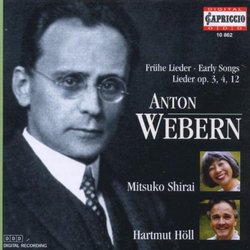| All Artists: Anton Webern, Mitsuko Shirai, Hartmut Höll Title: Webern: Early Songs, Op. 3, 4, 12 Members Wishing: 0 Total Copies: 0 Label: Capriccio Release Date: 4/24/2001 Genres: Pop, Classical Styles: Vocal Pop, Chamber Music, Historical Periods, Classical (c.1770-1830), Modern, 20th, & 21st Century Number of Discs: 1 SwapaCD Credits: 1 UPC: 018111086226 |
Search - Anton Webern, Mitsuko Shirai, Hartmut Höll :: Webern: Early Songs, Op. 3, 4, 12
 | Anton Webern, Mitsuko Shirai, Hartmut Höll Webern: Early Songs, Op. 3, 4, 12 Genres: Pop, Classical
|
Larger Image |
CD Details |
CD ReviewsVienna fin de siècle Fabrizio C. Celentano | Milano, Italy | 01/14/2008 (5 out of 5 stars) "I am not a musicologist, I simply would like to share the reasons why I bought this CD.
The last years of 1800 and the first ones of the new century are especially interesting. The world was changing and the great empires were setting the stage for their dissolution. Only the British empire was to survive, if only for a few decades. A dinosaur on the verge of extinction. Art and culture, as always, are a sensitive indicator of the change. This is particularly evident in Vienna. One may say that two widely different Austrias coexisted, and clashed: the old military empire that Franz Joseph was able to preserve after the turmoils of 1848, and the new, peaceful, Austria of the Jugendstil. At the border the fin-de-siècle, mostly bourgeois, Austria so well represented by Johann Struss. Klimt painted the Opera on the Ring, a work appreciated by the old emperor, and shortly after Otto Wagner was building the stations of the new underground, and the Steinhof church that Cacciari chose as a symbol of the change in progress Posthumous People: Vienna at the Turning Point (Meridian: Crossing Aesthetics). The same Wagner and others built the incredible palaces of the Linke Wienzeile whilst the residual romantics continued to build in the eighteenth century way for the nobility and the rich bourgeosie. There were also Ludwig Wittgenstein, Peter Altenberg, Robert Walser, Lou Andreas-Salomé, Adolf Loos, Martin Buber, Egon Schiele, Karl Kraus, and Arnold Shoenberg, and Bela Bartok, and the Vienna Circle... Some of these, as well as several Italian futurists, and many others, were to die in the 1914-18 clash and the Austrian culture, after a short period of freedom in parallel with the German Weimar culture, was to receive a hard blow by the nazis. Well, in my mind these lieder by Webern perfectly represent the transition from the old Romantic world to the new, after WW1, world, as seen in Vienna, a town where it is easy to feel at home, reading at the Sacher or hearing music anywhere, or drinking Heuriger and singing together in Sievering. These lieder, and all the culture that nurtured Webern and the other great Austrians of the turn of the century, mark the beginning of the culture that nurtured a few European generations after them, up to mine, the one born just before WW2. A similar epocal change is sweeping us away, but our culture, and our music, is here to stay." |

 Track Listings (30) - Disc #1
Track Listings (30) - Disc #1